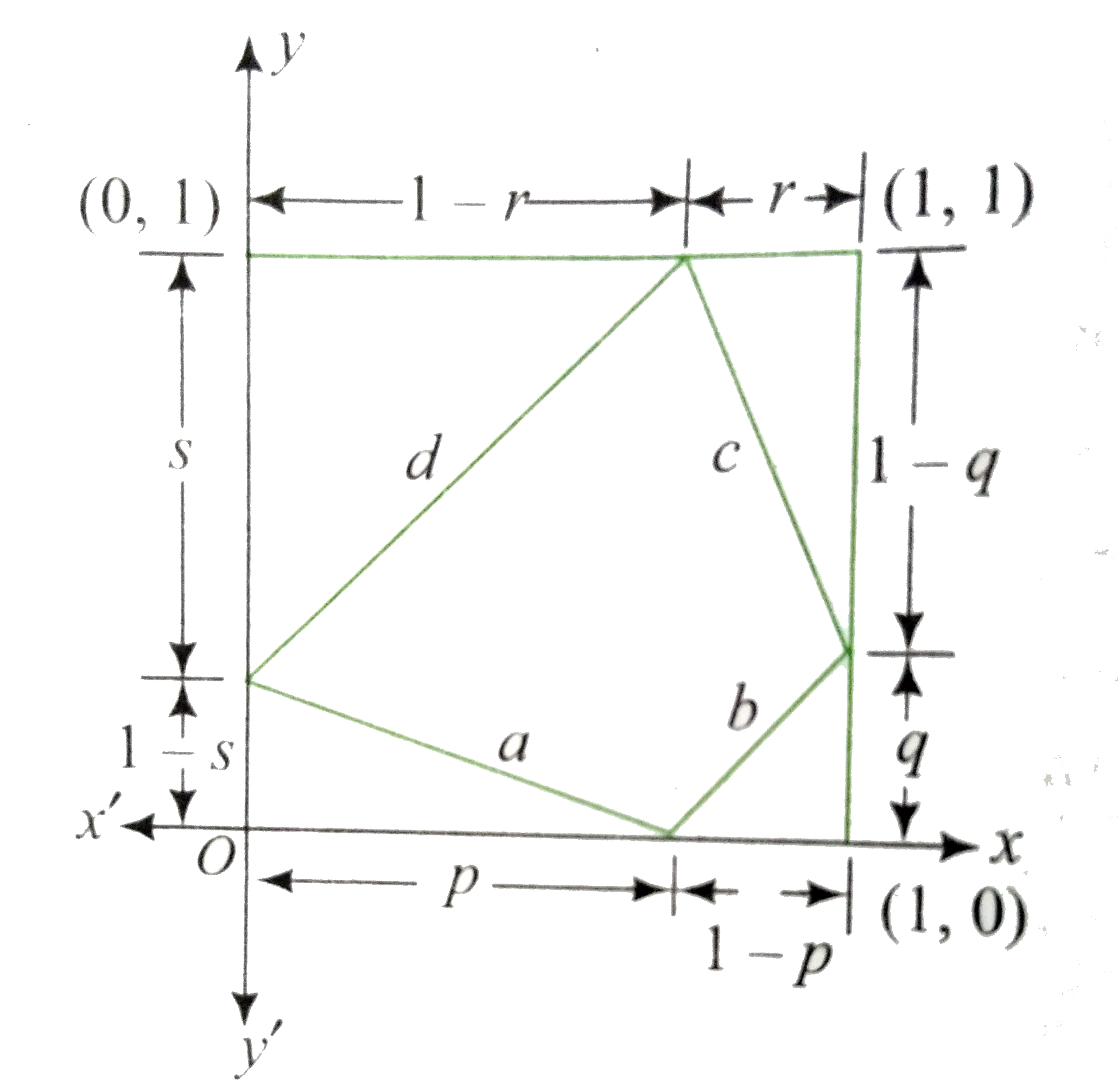Let S be a square of nit area. Consider any quadrilateral, which has none vertex on each side of S. If a,b,candd denote the lengths of the sides of het quadrilateral, prove that 2≤a2+b2+c2+x2≤4.

From the figure
a2=p2+(1−s)2
b^(2) = (1 - p)^(2) + q^(2)<br>a^(2) + b^(2) + c^(2) + d^(2)= [ p^(2) + (1 - p)^(2)] + [q^(2) + ( 1 - q)^(2) ] <br> [ r^(2) + (1 - r)^(2)] + [s^(2) + ( 1 - s)^(2) ],wherep,q,r,sin[0,1]<br>Nowconsrthefunction<br>y = x^(2) + (1 - x)^(2), 0 le x le 1<br>rArr y = 2x^(2) - 2x + 1 = 2 (x - (1)/(2))^(2) + (1)/(2)<br>Hence,miniμmvalueis1//2whenx=1//2andmaxiμmvalueisatx=1,whichis1.Therefore,miniμmvalueofa^(2) + b^(2) + c^(2) d^(2)is1//2+ 1//2 + 1//2 +1//2 = 2andmaxiμmvalueis1 + 1 + 1 + 1 = 4.
Topper's Solved these Questions
- THEORY OF EQUATIONSBOOK - CENGAGECHAPTER - THEORY OF EQUATIONSEXERCISE - Exercise 2.1
3 Videos
- THEORY OF EQUATIONSBOOK - CENGAGECHAPTER - THEORY OF EQUATIONSEXERCISE - Exercise 2.2
5 Videos
- THEORY OF EQUATIONSBOOK - CENGAGECHAPTER - THEORY OF EQUATIONSEXERCISE - Multiple Correct Answer
6 Videos
- STRAIGHT LINESBOOK - CENGAGECHAPTER - STRAIGHT LINESEXERCISE - JEE Advanced Previous Year
4 Videos
- THREE DIMENSIONAL GEOMETRYBOOK - CENGAGECHAPTER - THREE DIMENSIONAL GEOMETRYEXERCISE - Question Bank
12 Videos
Similar Questions
Let S be a square of nit area. Consider any quadrilateral, which has none vertex on each side of S. If a,b,candd denote the lengths of the sides of het quadrilateral, prove that 2≤a2+b2+c2+x2≤4.
View SolutionLet S be a square of unit area. Consider any quadrilateral which has one vertex on each side of S. If a,b,c and d denote the lenghts of the sides of the quadrilateral,
Prove that 2≤a2+b2+c2+d2≤4.
View Solution
Knowledge Check
A quadrilateral has one vertex on each side of a square of side-length 1. If the lengths of the quadrilateral are a, b, c, d, then
A2≤a2+b2+c2+d2≤4B1≤a2+b2+c2+d2≤4C√2≤a2+b2+c2+d2≤4D2√2≤a2+b2+c2+d2≤4
Let S be the square of unit area. Consider any quadrilateral which has one vertex on each side of S. If a, b, c and d denote the lengths of the sides of the quadrilateral, prove that 2≤a2+b2+c2+d2≤4.
View SolutionLet S be a square of unit area. Consider any quadrilateral which has one vertex on each side of S. If a,b,candd denote the lengths of sides of the quadrilateral, prove that 2≤a2+b2+c2+d2≤4
View SolutionIf a,b,c,d are the side of a quadrilateral, then find the the minimuym value of a2+b2+c2d2
View SolutionIf a,b,c,d are the side of a quadrilateral, then find the the minimuym value of a2+b2+c2d2
View SolutionLet a≤b≤c be the lengths of the sides of a triangle. If a2+b2<c2,thenprovetˆ∠Cisobtuse.
View SolutionIn a quadrilateral ABCD , the angles A, B, C and D are in the ratio 1:2:3:4. Find the measure of each angles of the quadrilateral.
View SolutionIn a quadrilateral ABCD, the angles A, B, C and D are in the ratio 1:2:3:4 . Find the measure of each angle of the quadrilateral.
View Solution
